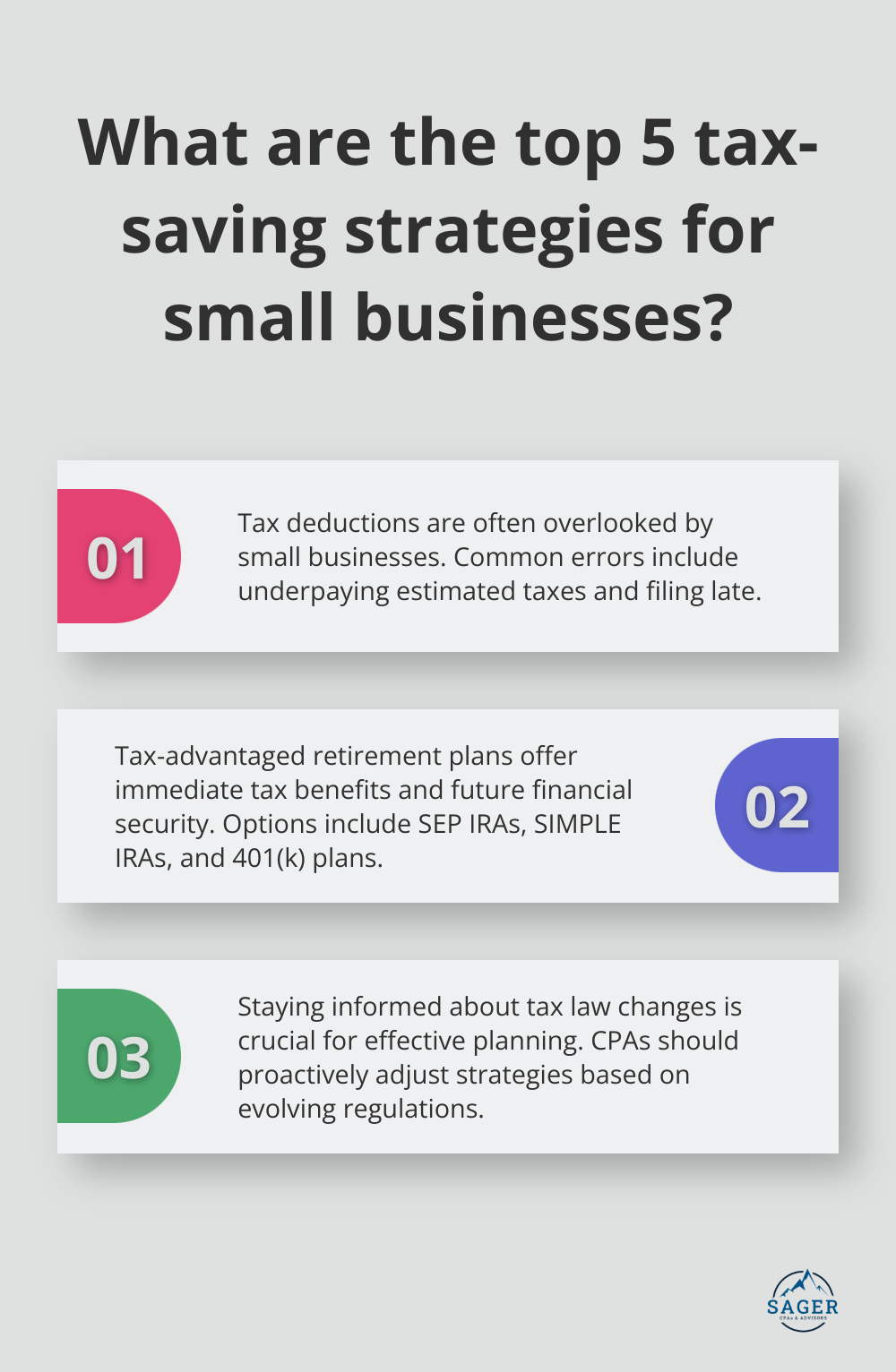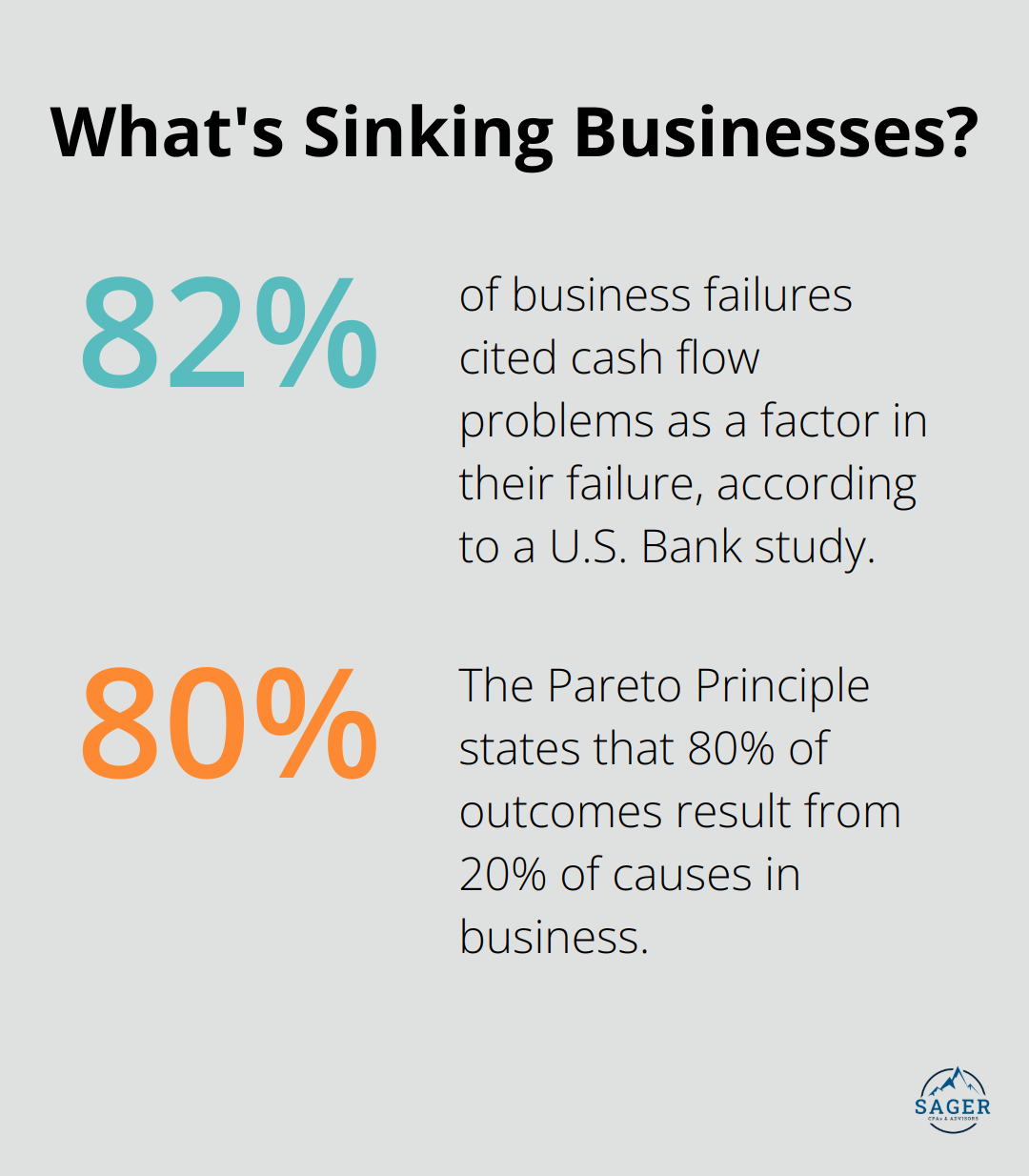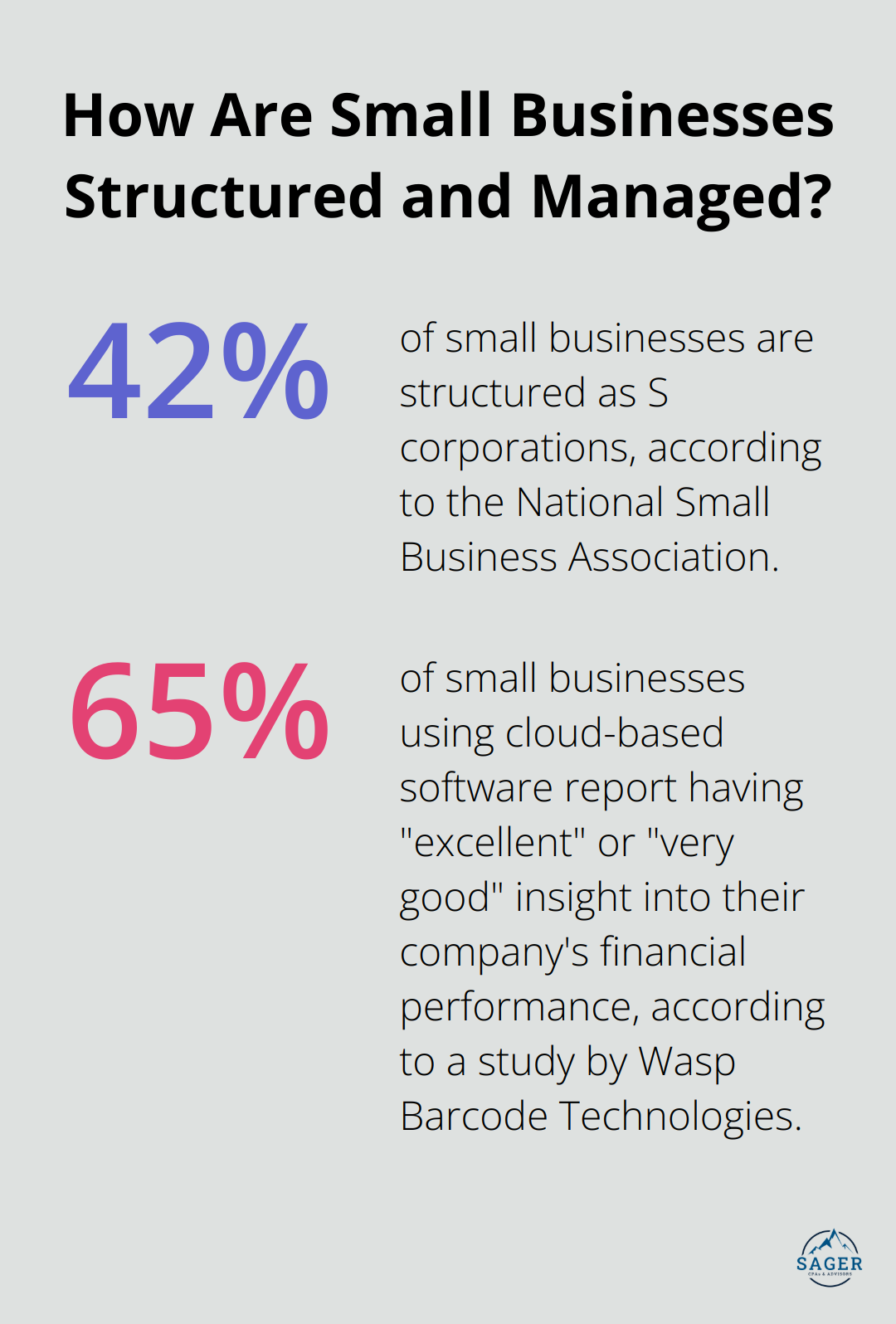
At Sager CPA, we know that asking the right questions can make a world of difference for your small business’s financial health.
Effective communication with your CPA is key to unlocking valuable insights and strategies tailored to your unique business needs.
This guide outlines essential questions to ask a CPA for a small business, helping you maximize your financial advisor relationship and drive your company’s success.
Tax planning plays a vital role in financial management for small businesses. Strategic tax planning can significantly impact a company’s bottom line. Let’s explore key areas where you can potentially reduce your tax burden and improve your overall financial health.
Many small business owners miss out on valuable tax deductions due to lack of awareness. Common tax errors that can be costly for small businesses include underpaying estimated taxes, depositing employment taxes incorrectly, filing late, and not maintaining proper records. A thorough review of your expenses with your CPA will ensure you claim all eligible deductions and avoid these common mistakes.
Setting up a tax-advantaged retirement plan secures your financial future and provides immediate tax benefits. Options like SEP IRAs, SIMPLE IRAs, or 401(k) plans allow you to contribute pre-tax dollars, which reduces your taxable income. Small businesses that offer retirement plans can benefit from tax credits, tax deductions, improved employee productivity and retention, and easier management of retirement savings.
Tax laws constantly evolve, and staying informed is essential for effective tax planning. Your CPA should prioritize staying abreast of these changes and proactively adjust your tax strategies accordingly.
Accurate and organized financial records form the foundation of successful tax planning. Implement a robust system to track income, expenses, and deductions throughout the year. This practice not only simplifies tax preparation but also provides valuable insights for business decision-making.
Different industries often have unique tax incentives and credits available. Research and discuss with your CPA any industry-specific tax benefits that may apply to your business. These can range from research and development credits to energy-efficient building deductions.

As we move forward, let’s examine how financial analysis and growth planning can complement your tax strategy and drive your business towards greater success.
Financial analysis forms the foundation of informed decision-making for small businesses. We emphasize the importance of key financial metrics to drive growth and improve overall business performance.
Every business has unique KPIs that reflect its health and progress. Small businesses often focus on cash flow, gross profit margin, and customer acquisition cost as critical metrics. Close monitoring of these metrics allows you to spot trends, identify areas for improvement, and make data-driven decisions.
Effective cash flow management determines small business survival and growth. A U.S. Bank study found that 82% of business failures cited cash flow problems as a factor in their failure. To improve your cash flow:
Your financial data contains valuable insights for growth. Analysis of your revenue streams helps identify your most profitable products or services. The Pareto Principle often applies in business, stating that 80% of outcomes result from 20% of causes. This information allows you to focus your resources on high-performing areas and consider phasing out underperforming ones.

Examination of your customer acquisition costs and lifetime value proves essential. If you spend more to acquire customers than they’re worth over time, it’s time to reassess your marketing strategies. Industry experts suggest an ideal customer acquisition cost to lifetime value ratio of 1:3.
Modern accounting software and business intelligence tools streamline financial analysis processes. These tools (such as QuickBooks, Xero, or Tableau) provide real-time insights into your business’s financial health. They allow you to create customized dashboards, generate detailed reports, and visualize data trends effortlessly.
While technology aids in financial analysis, the expertise of a qualified CPA proves invaluable. A CPA interprets complex financial data, provides context to your business’s performance, and offers strategic advice tailored to your specific industry and goals. Outsourced accounting services can provide expert guidance to small businesses, ensuring you make the most of your financial data.
As we move forward, let’s explore how your business structure and compliance practices impact your overall financial strategy and growth potential.
Your business structure and compliance practices significantly impact your tax efficiency and legal protection. The structure you select affects your tax obligations, personal liability, and operational flexibility. Let’s explore how to optimize these aspects for your small business.
Your business structure significantly affects your tax liability. Sole proprietorships and partnerships offer simplicity but expose owners to personal liability. Corporations provide liability protection but face double taxation. S corporations offer a middle ground, allowing pass-through taxation while providing liability protection. They also provide tax benefits, including no or lesser corporate and self-employment tax for owners, and no double taxation for shareholders.

The National Small Business Association reports that 42% of small businesses are structured as S corporations, making it the most popular choice. However, the best structure depends on your specific circumstances. You should review your business structure annually to ensure it aligns with your current needs and future goals.
Compliance with regulatory requirements is essential for small businesses.
Key areas of compliance include:
Create a compliance calendar to track deadlines and requirements. This proactive approach helps avoid costly penalties and maintains your business’s good standing.
Effective financial record-keeping supports compliance and informed decision-making. The IRS requires businesses to keep records for at least three years from the date you file your tax return. However, you should keep records for seven years to be safe.
To improve your record-keeping processes:
A study by Wasp Barcode Technologies found that 65% of small businesses that use cloud-based software report having “excellent” or “very good” insight into their company’s financial performance. This improved visibility can lead to better decision-making and financial outcomes.
Navigating business structures and compliance can be complex. A qualified CPA can provide valuable insights and help you make informed decisions. They can assess your current structure, identify potential tax savings, and ensure you meet all regulatory requirements.
Expert guidance becomes particularly important as your business grows and faces new challenges. A CPA can help you adapt your structure and compliance practices to support your evolving needs and goals.
Asking the right questions to your CPA will propel your small business towards financial success. We at Sager CPA emphasize the importance of tax planning, financial analysis, and business structure optimization to unlock valuable insights tailored to your unique needs. Open communication with your financial advisor will keep you informed about tax law changes, identify growth opportunities, and ensure compliance with regulatory requirements.

Regular reviews of tax strategies, analysis of key financial metrics, and assessment of your business structure will lead to informed decisions and drive company growth. Effective record-keeping systems and technology for financial analysis will streamline processes and provide real-time insights into your business’s financial health. Our team of experts offers comprehensive financial management and tax planning services tailored to your specific needs (including guidance on questions to ask a CPA for a small business).
We provide strategic business advisory services, proactive tax planning, and customized action plans to help you achieve long-term financial stability and growth. Schedule a consultation with Sager CPA to take the next step in optimizing your small business’s financial strategy. Our personalized approach and commitment to regular communication will help you navigate complex financial landscapes and drive your business towards success.




Privacy Policy | Terms and Conditions | Powered by Cajabra
At Sager CPAs & Advisors, we understand that you want a partner and an advocate who will provide you with proactive solutions and ideas.
The problem is you may feel uncertain, overwhelmed, or disorganized about the future of your business or wealth accumulation.
We believe that even the most successful business owners can benefit from professional financial advice and guidance, and everyone deserves to understand their financial situation.
Understanding finances and running a successful business takes time, education, and sometimes the help of professionals. It’s okay not to know everything from the start.
This is why we are passionate about taking time with our clients year round to listen, work through solutions, and provide proactive guidance so that you feel heard, valued, and understood by a team of experts who are invested in your success.
Here’s how we do it:
Schedule a consultation today. And, in the meantime, download our free guide, “5 Conversations You Should Be Having With Your CPA” to understand how tax planning and business strategy both save and make you money.